When you get hurt because someone else was careless, it’s key to know what compensation you might get. This is true for car crashes, slip and falls, or bad medical care. Understanding the damages you can ask for is important for your recovery in all ways.
The compensation in injury cases covers many needs. It includes medical bills and lost income to compensation for pain and even losses from a loved one’s death. But what are these types, and how do they help you?
We’re going to look at different kinds of compensation you might get, including some that are not well-known. This guide will help you feel more confident as you deal with your injury case.
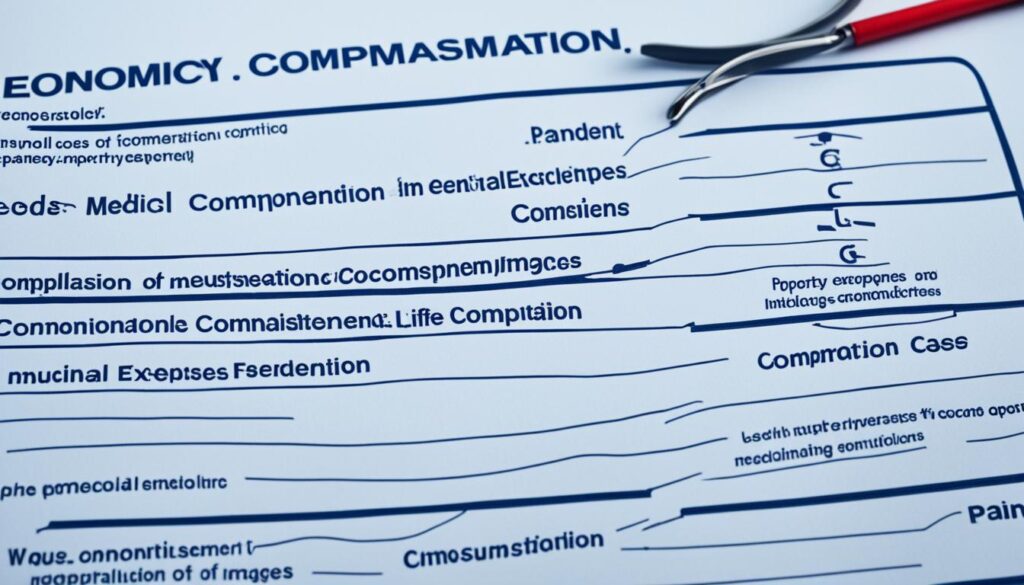
Key Takeaways:
- Personal injury cases offer compensation for things like medical costs, lost earnings, property damage, and emotional pain.
- There are mainly two kinds of compensation: compensatory damages for losses and punitive damages to punish the fault party.
- Important parts of injury compensation include covering medical bills, lost income, property damage, emotional suffering, death losses, and punitive damages.
- There might be limits on the compensation you can receive because of laws or insurance rules.
- You can get compensation for personal injuries by filing a claim with insurance or by suing.
Compensatory and Punitive Damages in Personal Injury Claims
It’s critical to know the compensation types in a personal injury claim. Two major damages awarded are compensatory and punitive damages.
Compensatory Damages
Compensatory damages make up for losses from the accident.
They cover various needs:
- Medical expenses: Paying back costs for treatments, surgeries, and therapy.
- Lost wages: Money for income lost due to injury, including future earnings.
- Property damage: Paying for damage to items like your car or gadgets.
- Pain and suffering: Money for physical and emotional distress.
- Wrongful death damages: Financial aid for family IF a loved one dies.
The goal of compensatory damages is to return the injured to their original state.
Punitive Damages
Punitive damages serve to punish the at-fault party, not compensate the injured.
They’re for cases with severe negligence.
Not all cases get punitive damages. They are for extreme behavior.
Punitive damages have limits and vary by place.
Avoiding them requires knowing the law, so lawyer advice is needed.
“Punitive damages are a way for the legal system to send a message that certain behavior will not be tolerated, and to deter others from engaging in similar misconduct.”
To get fair compensation, understanding both damages is key. Legal advice is essential for compensatory and punitive damages.
Next, let’s see how medical costs are managed in personal injury claims.
Medical Expenses and Reimbursement in Personal Injury Claims
When you have a personal injury claim, getting back money for medical costs is key. These expenses can become very high quickly. They put a lot of financial pressure on the person hurt.
Medical expenses in personal injury claims cover many things. This includes doctor visits, surgeries, and medications. It also covers physical therapy, assistive aids, home changes, and travel for medical care.
Keeping and organizing all medical bills and receipts is vital. This paperwork includes invoices and pharmacy receipts. They show the costs you’ve had because of the injury.
When making a settlement offer, include all medical expenses now and in the future. Waiting until you fully recover or have a final health status helps. This makes sure all future costs are in the offer.
For example, imagine someone gets hurt in a car crash and has severe head injuries. They might need to stay in the hospital, have tests, get brain surgery, see their doctor often, and go through a lot of rehab. All these costs should be in the claim.
Talking to a good personal injury lawyer can help you understand reimbursement better. They can deal with the claim’s hard parts. They talk to insurance companies for you and make sure you get fair money back for your medical costs.
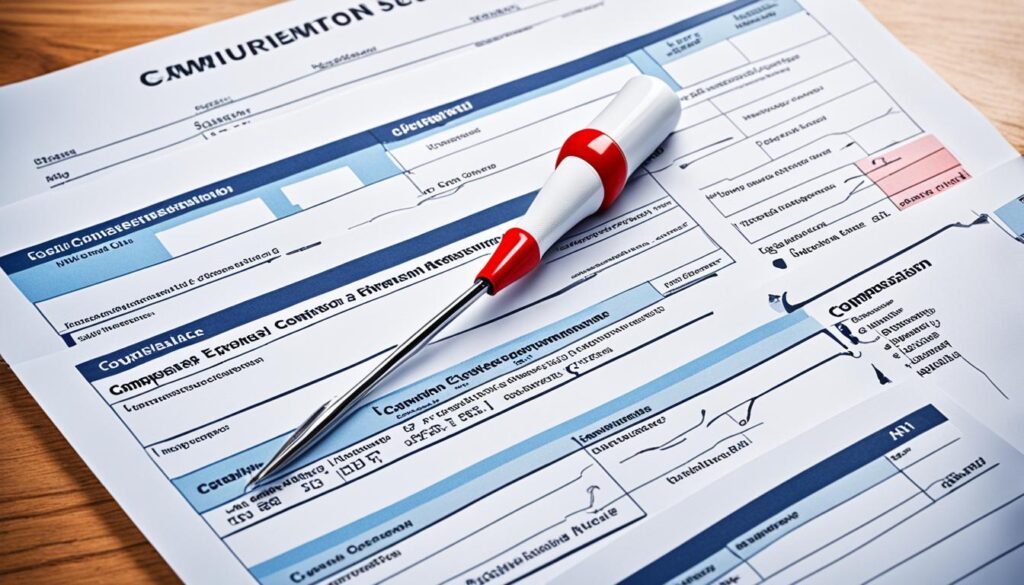
| Types of Medical Expenses | Reimbursement Process |
|---|---|
| Doctor visits | Submit invoices and receipts from healthcare providers |
| Surgeries | Provide surgical reports and associated bills |
| Medications | Keep track of pharmacy receipts |
| Physical therapy | Obtain invoices from therapy providers |
| Assistive aids and modifications | Provide proof of purchase and installation costs |
| Travel expenses | Keep receipts related to medical appointments |
Getting your medical costs reimbursed needs you to pay close attention to the details. A personal injury lawyer with experience makes sure you don’t miss anything important. They help include all your medical expenses in your settlement.
Lost Wages and Compensation in Personal Injury Claims
Recovering lost wages is a key part of personal injury claims. When people get hurt and can’t work, they may get money for lost wages. This covers wages missed and wages they can’t earn going forward due to injuries.
Besides base salary, lost wages cover more. This includes sick time, vacation, promotions, and other work benefits lost due to injury. It aims to make up for all financial losses caused by the injury.
Figuring out lost wages can get complicated with permanent injuries. This might change someone’s career or affect future money-making abilities. Often, a financial expert’s help is needed to figure out lost wage value.
“Through lost wages compensation, personal injury claimants can be financially compensated for the income they have lost and the impact the injury has had on their future earning potential.”
Evidence for Lost Wages
To claim lost wages in personal injury cases, you need proof. This proof shows how the injury affected earning capacity.
Supporting a lost wages claim needs various proofs:
- Medical records and documentation of the injuries sustained
- Employment records, including pay stubs, tax returns, and employment contracts
- Documentation from healthcare professionals attesting to the inability to work
- Statements from employers verifying the time missed from work and the resulting financial losses
Collecting and showing this evidence makes the financial impact of the injury clearer. This helps make a stronger case for lost wages compensation.

Lost wages compensation is crucial in personal injury claims. It helps injured people not just with medical bills and suffering, but also with financial losses. By fairly assessing lost wages, claimants can find financial stability as they heal.
Property Loss and Reimbursement in Personal Injury Claims
Personal injury claims cover more than physical harm. They include property damage from accidents. If items like your car or tech are harmed in an accident, you may get money back for their repair costs or their worth.
Getting compensated for property loss is key in personal injury claims. It helps victims get back on their feet financially after damage. By claiming for property damage, you ensure getting the needed money to fix or replace what was damaged.
Consider a car accident that damages your vehicle. You can ask for money back for fixing it or its total worth if it’s a write-off. This way, you won’t have to cover the repair or replacement costs alone.
“Including property loss in your personal injury claim can help you recover financially and ensure that you are not left with the burden of repair or replacement costs.”
To support your claim, collect evidence of the damage like photos, repair quotes, or receipts. This info will show how bad the damage is and help calculate how much money you should get back.
An experienced personal injury lawyer can make a big difference. They can walk you through the claims process, gather evidence, and talk to the insurance company for you. This helps ensure you get the compensation you deserve.
Steps to take for property loss reimbursement
| Step | Description |
|---|---|
| 1 | Document the property damage with photographs or videos. |
| 2 | Obtain repair estimates or quotes from reputable sources. |
| 3 | Keep records of any receipts or invoices related to property repairs or replacements. |
| 4 | Contact an experienced personal injury attorney to assess your claim and determine the appropriate amount of reimbursement. |
| 5 | Submit your claim to the at-fault party’s insurance company, providing all necessary documentation and evidence. |
| 6 | Negotiate with the insurance company or the responsible party to reach a fair settlement for your property loss. |
Follow these steps to boost your chance of getting properly reimbursed for property loss. Consulting a personal injury attorney is critical. They ensure your rights are protected and you get fair compensation for all claim aspects, including property damage.

Pain and Suffering Compensation in Personal Injury Claims
Getting money for pain and suffering is a key part of a personal injury settlement. If another’s carelessness or intentional act hurt you, getting compensated is fair. This payment is for the non-economic effects on your life and feelings.
Evaluating Pain and Suffering Compensation
Figuring out the right compensation for pain and suffering is hard. It’s different from clear costs like medical bills or lost pay. The decision is based on things like how severe the injury is and how it affects your life and feelings.
When evaluating this type of compensation, several factors are considered:
- The level of physical pain you felt
- The emotional distress from the injury
- How your daily life and happiness were affected
- How long your recovery is
- The chance of lasting or permanent harm
To decide on a fair amount for this compensation, a personal injury lawyer is crucial. They will look at your case’s details, find evidence, talk to medical experts, and look at similar cases to suggest a fair amount.
Examples of Pain and Suffering Compensation
Here are examples of pain and suffering payments in personal injury cases:
| Type of Injury | Compensation Range |
|---|---|
| Minor soft tissue injuries | $2,000 – $5,000 |
| Moderate injuries with long-term impact | $10,000 – $50,000 |
| Severe injuries with permanent disability | $100,000 – $500,000 |
| Catastrophic injuries causing significant pain and disability | $500,000 – $1,000,000+ |
These compensation ranges are examples and can change with each case’s details.
Having a good lawyer to negotiate is critical for fair compensation. They will make sure your suffering is seen and you get what you deserve.
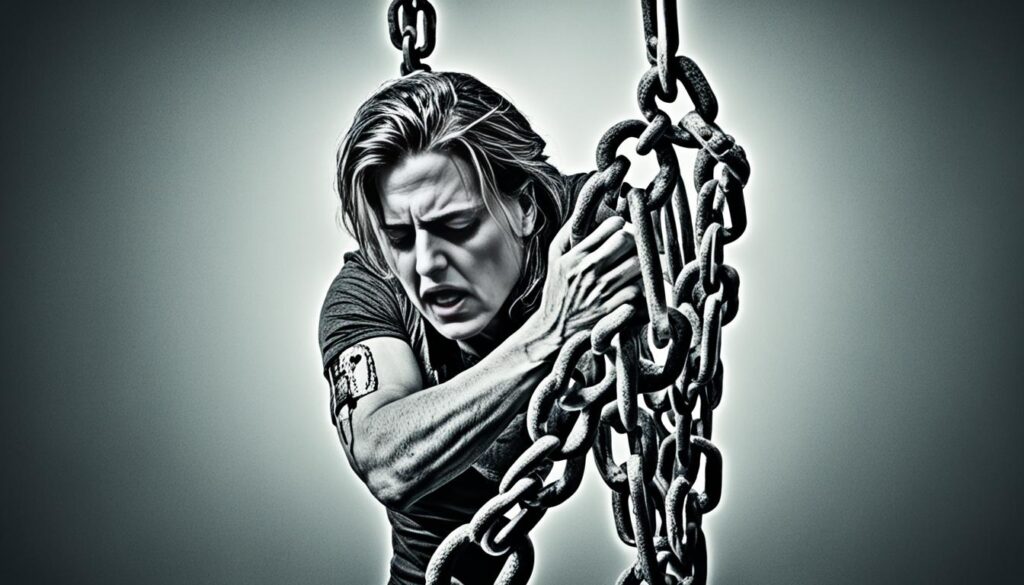
“Pain and suffering compensation is vital in a personal injury claim. It speaks to the emotional and physical burden of an injury. A skilled lawyer is key for ensuring you’re fairly compensated for your suffering.”
Wrongful Death Damages in Personal Injury Claims
When a family member dies from an accident, the survivors may sue for wrongful death. These damages can cover funeral costs, medical bills, lost financial support, companionship, and even lost inheritance. It aids in the family’s recovery after their loss.
Compensation for loss
The sudden loss of a loved one due to negligence causes deep sorrow. Though no money can replace them, wrongful death damages offer financial relief for their losses. It’s a support in their time of need.
Key to these damages is compensation for lost financial support. This refers to the income and contributions the deceased would have provided, helping their family’s future.
Funeral expenses
Covering funeral and burial expenses is part of wrongful death damages. This support lessens the financial and emotional weight on the family, allowing a respectful goodbye.
The costs of a funeral service, casket, burial plot, and other expenses add up. Wrongful death damages help manage these expenses, ensuring the family can honor their loved one properly.
| Wrongful Death Damages | |
|---|---|
| Reimbursement of funeral expenses | Including the cost of the casket, burial plot, funeral service, and related expenses |
| Medical expenses for the deceased person’s injuries | Covering the costs of medical treatment related to the accident that led to their death |
| Compensation for loss of financial support | Accounting for the income and financial contributions the deceased person would have provided to the family |
| Compensation for loss of companionship and consortium | Addressing the emotional and relational impact of losing a loved one |
| Compensation for lost inheritance | Reflecting the inheritance that would have been received if the person had lived |

Punitive Damages in Personal Injury Claims
In personal injury cases, the aim is to make up for the injured person’s losses. These losses come from another’s careless actions. Unlike compensatory damages, punitive damages have a unique goal. They punish the careless person and stop such actions in the future.
Punitive damages
are given when the careless party acts very badly, showing no care for others’ safety. For example, punitive damages might apply in drunk driving cases or where someone intentionally hurts another. But it’s key to remember that
punitive damages are rare
They’re mainly for cases where the wrongdoing is much worse than usual carelessness.
Some states limit how much can be given in punitive damages. These caps keep the damages from being too high and overwhelming for the defendant. Each state has its rules, so it’s key to talk to a lawyer who knows your state’s laws.
It’s key to note that
punitive damages
are different from compensatory damages. Compensatory damages cover actual losses like medical bills, lost wages, and suffering. They help the injured person financially, while punitive damages penalize the careless party.

Lastly,
punitive damages
have a special role in personal injury claims. They act as a punishment and discourage bad behavior. Though seldom given, they hold careless parties accountable. If you think you might get punitive damages in your case, talking to a skilled lawyer is crucial. They can help you navigate the law and aim for the compensation you need.
Limitations on Injury Compensation in Personal Injury Cases
When you’re in a personal injury case, know there are limits on what you can get. These limits can really change how much money you end up with. The main things that can set these limits are tort reform laws and what the insurance policy covers.
Tort Reform Laws
Some states have laws to reduce how much doctors pay in lawsuits, to keep healthcare costs down. These laws limit how much money you can get in personal injury cases. They mainly focus on money for things you can’t easily put a price on, like pain, or money to punish the person who caused the injury.
Money for things like pain, emotional upset, or losing someone’s company falls under non-economic damages. There are often caps on how much you can get for these. The idea is to stop super high payouts and keep insurance costs predictable.
Punitive damages are meant to punish the wrongdoer and stop others from doing the same. But, there are also caps on these, making big punishment payouts hard to get. Each state and each case might handle these caps differently.
Insurance Policy Limits
Insurance policy limits are another big thing that can cap your compensation. Policies have maximum limits on what they’ll pay. What you can get depends on the policy and what it covers.
For car insurance, there are often different limits for injuries and property damage. If the person at fault’s insurance doesn’t cover all your costs, you might only get up to their limit. So, even if your damages are more, you might not get the full amount.
Knowing these insurance limits is crucial when you’re seeking damages. Sometimes, you might have to look beyond the insurance, like suing the at-fault person directly.

It’s vital to understand these limitations on getting money in personal injury cases. It helps set realistic expectations and find your way through the legal steps. Talking with a skilled personal injury lawyer can make it easier to know your rights and get as much compensation as possible, despite the limits.
How to Obtain Personal Injury Compensation
Have you suffered a personal injury? Getting compensation is key for your physical and financial recovery. You can either file an insurance claim or sue for personal injury.
Insurance Claim: If someone else’s mistake caused your injury, file an insurance claim against their insurance. This needs proof of your injuries and medical records. After filing, you’ll negotiate with the insurance company for a fair deal.
Settlement: Many prefer to settle the claim. It’s quicker and avoids court. When negotiating, stand up for yourself and your rights. An experienced attorney can help you get a fair compensation.
Personal Injury Lawsuit: Sometimes, you need to sue if a settlement can’t be reached. This means going to court against the person responsible. You’ll need to gather evidence and maybe even go to trial. Winning could mean getting compensated by the court.
Filing a lawsuit is longer and more complex than settling. Yet, it might be needed for a fair deal. A lawyer will help you through the legalities and protect your rights.
Benefits of Settelling Outside of Court
Settling outside of court can be advantageous:
- Quicker resolution: it speeds up compensation.
- Less risk: you avoid the unpredictability of a jury.
- Lower costs: legal fees are generally less.
- Privacy: settlements stay private, unlike court cases.
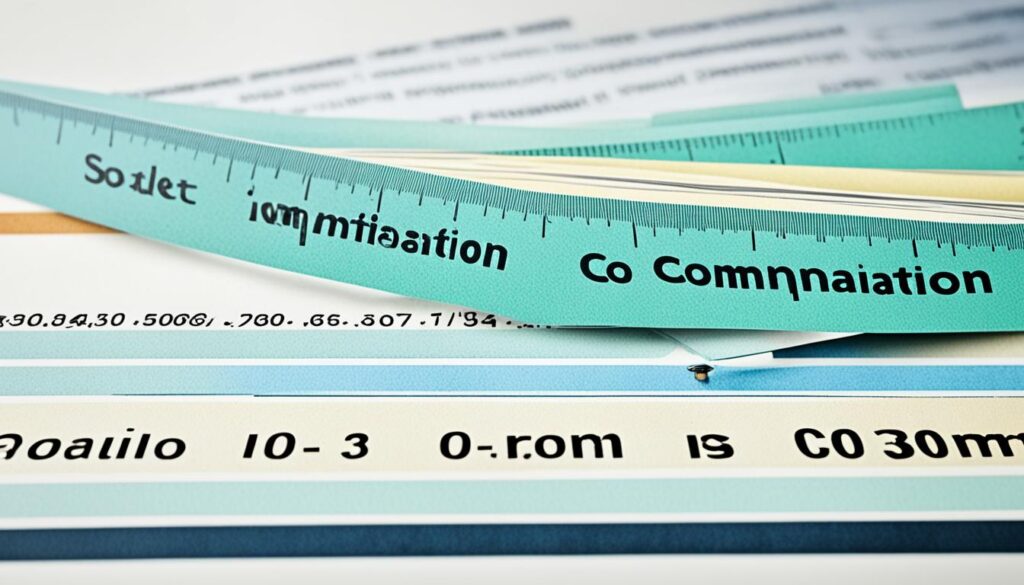
Types of Compensation in Various Personal Injury Cases
There are many personal injury cases, like car accidents and slip and falls. They happen because someone was negligent or did something on purpose. The compensation you get depends on what happened in your accident or injury.
If you get injured in a car accident, you might get money for medical bills, fixing your car, and lost wages. You could also get money for your pain and suffering and if you can’t enjoy life as before. Slip and fall accidents might pay for your medical bills, lost wages, and making your home accessible. Product liability cases cover your medical costs, lost earnings, and dealing with a faulty product. In cases like assault, you may get money for medical bills, lost earnings, emotional stress, and even punitive damages.
Remember, every case is different. The compensation you can seek depends on your specific situation. Talking to a lawyer who knows about personal injury can help you understand your rights and what money you could get.
Examples of Compensation Types in Various Personal Injury Cases:
- Car Accidents:
- Medical expenses
- Rehabilitation costs
- Property damage
- Lost wages
- Pain and suffering
- Loss of enjoyment of life
- Slip and Falls:
- Medical expenses
- Rehabilitation expenses
- Lost wages
- Pain and suffering
- Home modifications
- Product Liability:
- Medical costs
- Lost income
- Pain and suffering
- Additional costs related to the defective product
- Intentional Torts:
- Medical expenses
- Lost wages
- Emotional distress
- Punitive damages
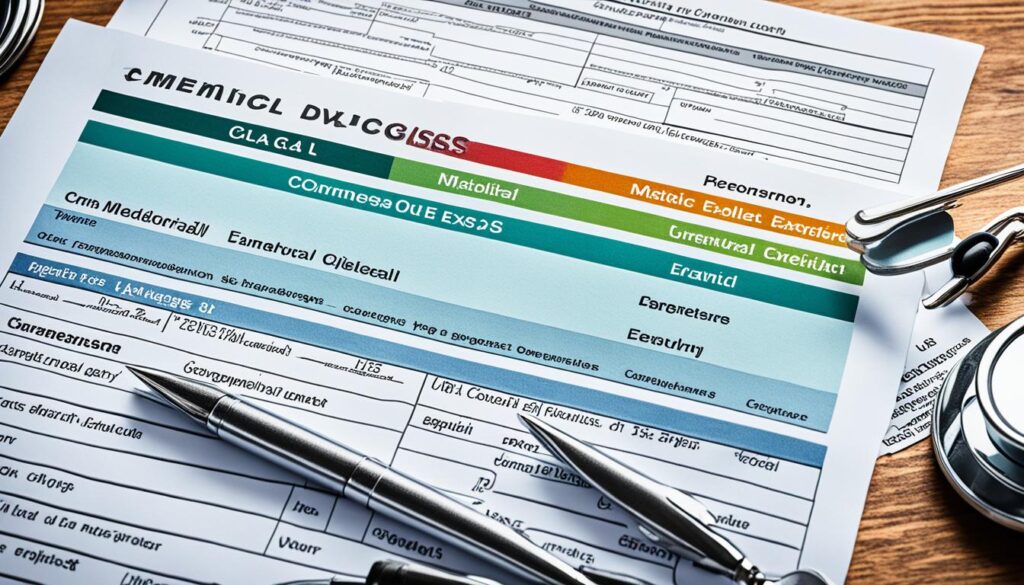
Knowing the types of compensation is key in personal injury cases. A skilled personal injury lawyer can guide you and help you get the compensation you deserve.
How to Collect Personal Injury Damages
After winning personal injury damages, the collection phase starts. If settled, you sign a release and get a check from the insurer. It’s a direct and simple way to gather personal injury compensations.
Yet, after a court victory, things get tricky. Sometimes, the defendant might appeal, which delays compensation. And if they can’t pay, you might need extra legal steps for full payment.
This is when a skilled personal injury lawyer comes in handy. They’ll help you through the process, handle appeals, and look for ways to ensure you’re paid. This may include garnishing wages or putting liens on defendant assets. Their knowledge is key in making sure you get what you deserve.